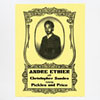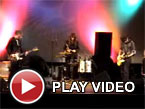Andre Ether with Christopher Sandes featuring Pickles and Price
Sonic Unyon
 Don't let it turn your brown eyes blue, and don't let them turn yourblues beige. Andre Ethier takes a break from his day job with theDeadly Snakes to take a stab at a record whose components could befound strewn across dozens of other releases. This is no cut-and-pastepastiche work of interpolations, but rather a slab of traditional(read: tired) old blues motions compiled into original works. Ethierindulges in an brusque exploration of the blue-eyed blues (though Iadmit not knowing what color his eyes are, really), strumming anacoustic guitar along the same world-weary twelve bars that musicianshave been walking for decades, with or without the benefits of a bassline. It's difficult to hear the performer through his influences, withthe arraignments paying a slavish tribute to the core of most songsreleased before 1970 and Ethier's Dylanesque phrasing leaving verylittle room for interpretation. "Little Saddy" is a notable offender,with the regrettable formula of repeating the first line of the versetwice before reaching a new thought. A standard blues move if thereever was one, though such moves only work when that line isparticularly sharp, or delivered with some kind of intense conviction.Unfortunately, when the Dylan recedes, the listener is left with onlyEthier, sounding completely hollow and flat. On "The Hanging Man,"Ethier asks his band mates for a big finish just before the final bars,and the response is an abrupt thud that makes for a curiously anemicclose. Without a doubt, there are elements of this record that willappeal to some. There are the lingering glimmers of Ethier's influencesthat haunt every song, and the purist trappings of the fully acousticsetup and live to tape recording process. The former, however amusingthe familiar sounds might be, does not make for a compelling record,only a catalog of weak versions of other people's hooks, meticulouslystraightened out and made dull. That it was recorded live to tape ispart badge and part excuse, providing a raw and unfettered version ofEthier and company's performance together—a claim that the neat andtidy recording does not back up. The ensemble is extremely reserved,daring not to wander out of the linear structures of their songs. Idon't mean to say that they should have devolved their trad-blues intosome kind of psychedelic freak out, but that their homage is far toopristine and clinical to ever capitalize on the crackling,devil-may-care lineage they seek to identify their music with.
Don't let it turn your brown eyes blue, and don't let them turn yourblues beige. Andre Ethier takes a break from his day job with theDeadly Snakes to take a stab at a record whose components could befound strewn across dozens of other releases. This is no cut-and-pastepastiche work of interpolations, but rather a slab of traditional(read: tired) old blues motions compiled into original works. Ethierindulges in an brusque exploration of the blue-eyed blues (though Iadmit not knowing what color his eyes are, really), strumming anacoustic guitar along the same world-weary twelve bars that musicianshave been walking for decades, with or without the benefits of a bassline. It's difficult to hear the performer through his influences, withthe arraignments paying a slavish tribute to the core of most songsreleased before 1970 and Ethier's Dylanesque phrasing leaving verylittle room for interpretation. "Little Saddy" is a notable offender,with the regrettable formula of repeating the first line of the versetwice before reaching a new thought. A standard blues move if thereever was one, though such moves only work when that line isparticularly sharp, or delivered with some kind of intense conviction.Unfortunately, when the Dylan recedes, the listener is left with onlyEthier, sounding completely hollow and flat. On "The Hanging Man,"Ethier asks his band mates for a big finish just before the final bars,and the response is an abrupt thud that makes for a curiously anemicclose. Without a doubt, there are elements of this record that willappeal to some. There are the lingering glimmers of Ethier's influencesthat haunt every song, and the purist trappings of the fully acousticsetup and live to tape recording process. The former, however amusingthe familiar sounds might be, does not make for a compelling record,only a catalog of weak versions of other people's hooks, meticulouslystraightened out and made dull. That it was recorded live to tape ispart badge and part excuse, providing a raw and unfettered version ofEthier and company's performance together—a claim that the neat andtidy recording does not back up. The ensemble is extremely reserved,daring not to wander out of the linear structures of their songs. Idon't mean to say that they should have devolved their trad-blues intosome kind of psychedelic freak out, but that their homage is far toopristine and clinical to ever capitalize on the crackling,devil-may-care lineage they seek to identify their music with.
 Don't let it turn your brown eyes blue, and don't let them turn yourblues beige. Andre Ethier takes a break from his day job with theDeadly Snakes to take a stab at a record whose components could befound strewn across dozens of other releases. This is no cut-and-pastepastiche work of interpolations, but rather a slab of traditional(read: tired) old blues motions compiled into original works. Ethierindulges in an brusque exploration of the blue-eyed blues (though Iadmit not knowing what color his eyes are, really), strumming anacoustic guitar along the same world-weary twelve bars that musicianshave been walking for decades, with or without the benefits of a bassline. It's difficult to hear the performer through his influences, withthe arraignments paying a slavish tribute to the core of most songsreleased before 1970 and Ethier's Dylanesque phrasing leaving verylittle room for interpretation. "Little Saddy" is a notable offender,with the regrettable formula of repeating the first line of the versetwice before reaching a new thought. A standard blues move if thereever was one, though such moves only work when that line isparticularly sharp, or delivered with some kind of intense conviction.Unfortunately, when the Dylan recedes, the listener is left with onlyEthier, sounding completely hollow and flat. On "The Hanging Man,"Ethier asks his band mates for a big finish just before the final bars,and the response is an abrupt thud that makes for a curiously anemicclose. Without a doubt, there are elements of this record that willappeal to some. There are the lingering glimmers of Ethier's influencesthat haunt every song, and the purist trappings of the fully acousticsetup and live to tape recording process. The former, however amusingthe familiar sounds might be, does not make for a compelling record,only a catalog of weak versions of other people's hooks, meticulouslystraightened out and made dull. That it was recorded live to tape ispart badge and part excuse, providing a raw and unfettered version ofEthier and company's performance together—a claim that the neat andtidy recording does not back up. The ensemble is extremely reserved,daring not to wander out of the linear structures of their songs. Idon't mean to say that they should have devolved their trad-blues intosome kind of psychedelic freak out, but that their homage is far toopristine and clinical to ever capitalize on the crackling,devil-may-care lineage they seek to identify their music with.
Don't let it turn your brown eyes blue, and don't let them turn yourblues beige. Andre Ethier takes a break from his day job with theDeadly Snakes to take a stab at a record whose components could befound strewn across dozens of other releases. This is no cut-and-pastepastiche work of interpolations, but rather a slab of traditional(read: tired) old blues motions compiled into original works. Ethierindulges in an brusque exploration of the blue-eyed blues (though Iadmit not knowing what color his eyes are, really), strumming anacoustic guitar along the same world-weary twelve bars that musicianshave been walking for decades, with or without the benefits of a bassline. It's difficult to hear the performer through his influences, withthe arraignments paying a slavish tribute to the core of most songsreleased before 1970 and Ethier's Dylanesque phrasing leaving verylittle room for interpretation. "Little Saddy" is a notable offender,with the regrettable formula of repeating the first line of the versetwice before reaching a new thought. A standard blues move if thereever was one, though such moves only work when that line isparticularly sharp, or delivered with some kind of intense conviction.Unfortunately, when the Dylan recedes, the listener is left with onlyEthier, sounding completely hollow and flat. On "The Hanging Man,"Ethier asks his band mates for a big finish just before the final bars,and the response is an abrupt thud that makes for a curiously anemicclose. Without a doubt, there are elements of this record that willappeal to some. There are the lingering glimmers of Ethier's influencesthat haunt every song, and the purist trappings of the fully acousticsetup and live to tape recording process. The former, however amusingthe familiar sounds might be, does not make for a compelling record,only a catalog of weak versions of other people's hooks, meticulouslystraightened out and made dull. That it was recorded live to tape ispart badge and part excuse, providing a raw and unfettered version ofEthier and company's performance together—a claim that the neat andtidy recording does not back up. The ensemble is extremely reserved,daring not to wander out of the linear structures of their songs. Idon't mean to say that they should have devolved their trad-blues intosome kind of psychedelic freak out, but that their homage is far toopristine and clinical to ever capitalize on the crackling,devil-may-care lineage they seek to identify their music with.



